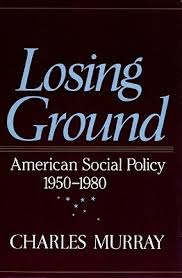Losing Ground (book)

Cover of the first edition
|
|
| Author | Charles Murray |
|---|---|
| Country | United States |
| Language | English |
| Subject | Welfare state |
| Published | November 1984 (hardback) January 1994 (paperback) |
| Media type | |
| ISBN | |
Losing Ground: American Social Policy, 1950-1980 is a 1984 book by political scientist Charles Murray about the effectiveness of welfare state policies in the United States between 1950 and 1980. It has been listed as one of the most influential books on policy and social science in the United States in the 20th century. It has created controversy because of its policy proposals.
Murray wrote the book while a fellow at the Manhattan Institute, then under the aegis of Irving Kristol. The Manhattan Institute funded his work on the book and also promoted it.Joan Kennedy Taylor of the Manhattan Institute is credited with having played a crucial role in helping the book see the light of day.
Murray's main thesis is that social welfare programs, as they have historically been implemented in the United States, tend to increase poverty rather than eliminate it by creating incentives that reward short-sighted behavior that is not conducive to escaping poverty in the long term.
Christopher Jencks wrote a detailed review of the book in the May 9, 1985 issue of the New York Review of Books. Murray responded to Jencks' critique, to which Jencks responded.
The Institute for Research on Poverty at the University of Wisconsin-Madison published a special report with the views of poverty researchers affiliated with the Institute on Murray's claims. A short 12-page summary was also published in their Focus magazine.
In 1985, a few months after the book's release, the New York Times called it a budget-cutter's bible, while also writing that the book's "proposition may be as deeply flawed as it is startling, unlikely to survive scrutiny."
In a December 1993 interview with NBC News, then US President Bill Clinton wrote of Murray and Losing Ground: "He did the country a great service. I mean, he and I have often disagreed, but I think his analysis is essentially right. ... There's no question that it would work. But the question is ... Is it morally right?"
...
Wikipedia
